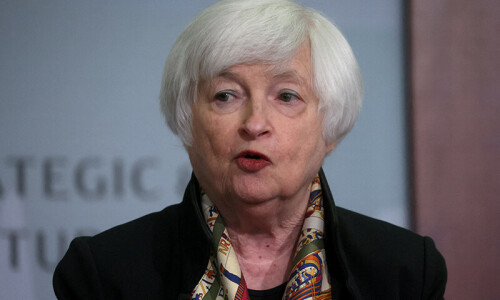
YOKOHAMA: President Barack Obama defended his economic recovery policies Saturday after top powers rebuffed US plans for binding trade targets and curbs on currency manipulation at the G20 summit.
Top administration officials pushed back against the notion that the G20 meeting, which ended in Seoul Friday, had turned into a global display of opposition to US policy, saying important core principles had been agreed.
Ahead of a Pacific Rim summit in Japan, Obama said he had never been more confident in what the United States had to offer, despite criticism that its slow rebound is a sign of waning US might as regional giants rise.
“Yes, the challenges that remain are great. There will be setbacks and disagreements and we won't solve every issue in one meeting or one trip or even in one term,” Obama said at a business conference in Yokohama, Japan.
He was speaking a day after G20 nations agreed to avoid currency manipulation and protectionism, but failed to fulfill US hopes for binding restrictions on issues at the core of deep global economic disputes.
“The United States tried to push an idea too fast, at a time when the foundation for cooperation is not as strong as it was during the crisis” that shook the world economy in 2008-09, IMF chief Dominique Strauss-Kahn told AFP.
Obama's top aides however, insisted that important progress had been made in Seoul, and argued that the issues in play were so complex and fundamental to each nation's economy, that it was not surprising they were so contentious.
“What is remarkable about the outcome --- the extraordinary thing is the degree of consensus that has been established that was on display in Seoul, where you had an agreement on the balanced growth framework,” said National Security Advisor Tom Donilon.
“It has been a very important organisation and I think quite successful,”he said pointing out that the grouping was established by the United States and was often driven by a US agenda.
The president argued in his speech that G20 developed and developing nations had shown an underlying determination to keep focused on global economic expansion despite disagreements on other issues.
“As the largest economy in the world, an engine for global growth, that's particularly important for the United States,” Obama said in a speech ahead of the 21-member Asia Pacific Economic Cooperation (APEC) talks.
“That is why we passed an economic plan that has led to five consecutive quarters of economic growth and 10 consecutive months of private sector job growth.
“That's why we passed and are implementing the toughest set of financial reforms since the Great Depression -- something our G20 partners need to do with the same sense of urgency.
“And that's why we're cutting back on non-essentials in the face of serious fiscal challenges.” Obama maintained that American human and financial resources had paved the way for the region's emergence and dynamic economies.
His speech was partly a summing up of his eight-day stay in Asia, which he billed as a mission to pry open export markets and create American jobs.
He argued, despite a sheaf of negative headlines about his diminished political clout following a “shellacking” by Republicans in mid-term elections, that his trip had successfully reinvigorated US engagement in a vital region.
“Yokohama is my last stop on a journey that has taken me from Mumbai and New Delhi to Jakarta and Seoul,” Obama said.
“The security and prosperity of the American people is inextricably linked to the security and prosperity of Asia. That is why this was not my first trip here, and why it will not be my last.
“America is leading again in Asia.” Obama also played a moral card, as he argued for America's continued relevance in a region which is seeing the rise of great powers like China and India and a parallel expansion of influence for Southeast Asian economies.
“In the last century, the United States of America contributed greatly to the security and prosperity of this region.
“The strength of our alliances and the bravery of our men and women in uniform helped keep the peace and the openness of our markets helped fuel the rise of the Asian Miracle.” – AFP













































Dear visitor, the comments section is undergoing an overhaul and will return soon.